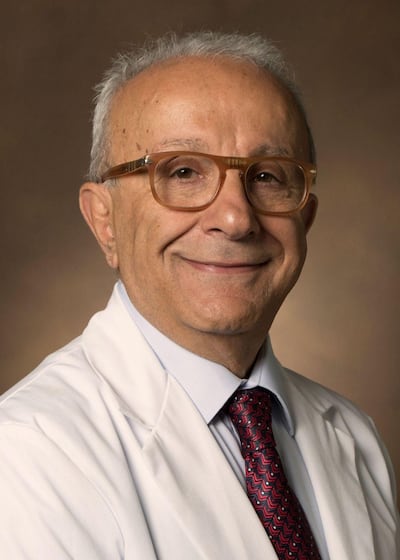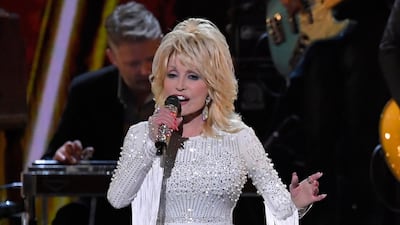When Naji Abumrad met country music star Dolly Parton in 2013, the Lebanese-American surgeon had no idea the pair would strike up a friendship and play a role in fighting a global pandemic.
Back then, Dr Abumrad was treating Parton at Vanderbilt University Medical Centre in Tennessee for bumps and bruises after a car crash. They chatted about science and a kinship emerged from their exchanges, he told The National.
This year, as Covid-19 tore across borders, the doctor told his famous blonde pal about university colleagues making headway against the pathogen. In April, she donated $1 million that helped to propel researchers towards what was unveiled last week as the virus-beating Moderna vaccine.
"What excited me about what Dolly did is it reaffirmed the power of science, and how science can be mobilised in a team approach to help humanity in such a short period of time," Dr Abumrad said this week.
The hospital in Nashville was one of the trial sites for Moderna’s vaccine, which is nearly 95 per cent effective, according to early data from a study involving 30,000 people in the US, with half being given two doses of the vaccine, four weeks apart.
Like Pfizer, which announced this month that it had developed a vaccine that is 90 per cent effective, Moderna, a biotech company, has released only early data from its trial. There is more work to be done before researchers will know if the vaccine really is safe and effective.
"I'm really happy and optimistic," said Dr Abumrad, 76. "It doesn't mean we won't have problems going forward. But you know what we have? We have at least two vaccines, with potentially three, four and five coming down the pike."
The positive vaccine results arrived at a grim moment in the pandemic, which has killed more than 250,000 people and infected 11.6 million in the US.

On Twitter this week, Parton, 74, the much-loved singer-songwriter of such hits as 9 to 5 and I Will Always Love You, said she was glad her money was doing good and that she hoped for a "cure real soon".
The musician was already widely admired for her music, charity work and co-owned Dollywood theme park in Tennessee, but her funding for a Covid vaccine has led to her being lionised as a "pandemic saviour".
One fan even posted a video of themselves singing a rehashed version of Parton's emotionally-charged 1973 classic Jolene, in which the song's titular character has been switched out for the word "vaccine".
On Twitter this week, Vanderbilt University Medical Centre thanked the megastar for helping to tackle a virus that has claimed 1.3 million lives globally since it emerged in central China late last year.
Moderna says it will apply to regulators in the US in the coming weeks and expects to have 20 million doses available.
Parton's donation also supported research papers and a study on convalescent plasma, where infected people are treated using the blood plasma of those carrying antibodies against the virus.
She has been a longtime supporter of charities, especially those related to literacy. She established the Imagination Library in 1995, which sends one book a month to children from the time of their birth until they enter kindergarten.
While Parton appears folksy and bubbly in television interviews, Dr Abumrad described her as "incredibly bright and inquisitive" and full of "pointed questions" during their chats on science and world affairs.
"I've learnt from her a lot about music, humanity, philanthropy," said Dr Abumrad, who graduated from the American University of Beirut in 1971 before moving to the US and developing expertise in diabetes.
The two were raised in different worlds. Dr Abumrad's village of Wadi Chahrour, outside Beirut, is 10,000 kilometres from Parton's native Appalachians. But the two shared underprivileged family backstories, he said.
"It's a beautiful country and Lebanese people are fantastic," said Dr Abumrad, father of US radio host Jad Abumrad. "But the poverty, corruption, wars, coronavirus and recent explosion ... the country is slipping into oblivion."


